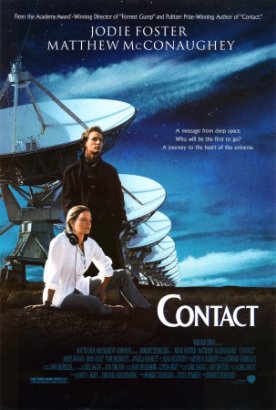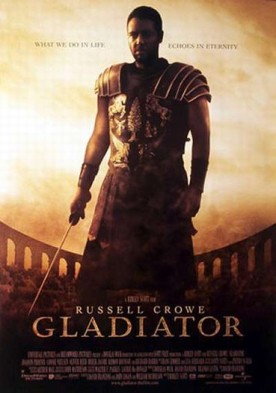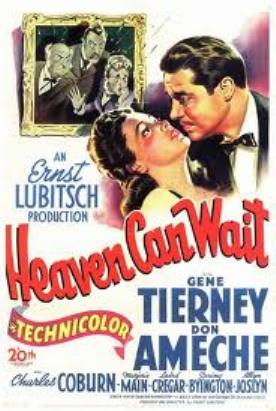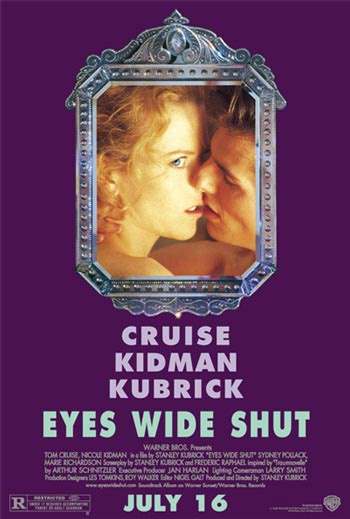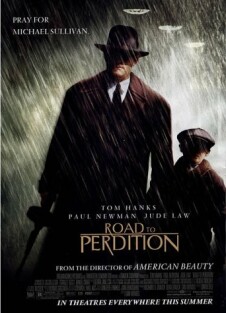Contact
If you liked Forrest Gump you will probably like Contact, which is by the same director, Robert Zemeckis. I didn’t like Forrest Gump. In fact, I hated Forrest Gump, so it is not surprising that I also hate Contact, which is full of exactly the same kind of cheap uplift as that on offer in the earlier film, right down to the plangent music for piano, flute and orchestra. It also makes use of the same kind of technological fakery, only this time it puts its heroes—a superbrilliant young astrophysicist called Ellie Arroway (Jodie Foster) who is looking for extraterrestrial intelligence and her lover, a sort of New Age guru called Palmer Joss (Matthew McConaughey)—into the same frame as a living president, instead of several dead ones.
Not too surprisingly, since this is the ultimate in taking someone out of context, the real president has protested. Likewise, CNN has found itself embarrassed by the number of its correspondents and “personalities,” including Larry King, who apparently leapt at the chance to play themselves in the film, and pretend to get all excited by the discovery of an alien life form. As in Forrest Gump, the point of this visual trickery is to flatter the “media” view of the world—even as it pretends to criticize it. Forrest Gump, supposedly a noble nobody, is elevated to celebrity status by juxtaposition with the great—or at least the famous—and so affirms that there are no noble nobodies, media logic requiring that they all be rewarded by fame.
In Contact the idea is slightly different, but the result is the same. Heroic science, working in obscurity, discovers not only alien intelligence but a message of hope for the world. The message is almost lost on account of the media circus it gives rise to and the machinations of nasty and selfish politicians and religious leaders, but it is essentially a message that the media itself could have scripted (in effect has scripted) namely, that the universe is like a ham-radio network, or perhaps the internet. Unimaginably distant civilizations simultaneously adopt as their nearest approach to the transcendent an exchange of radio pleasantries across the light-years, with an occasional expensive meeting for the purpose of putting a face to a disembodied voice.
It is a little hard for me to understand the sort of mind for which this kind of outcome is inspirational, but it is apparently not rare. Especially in the media. And it shares with the media mind a gut-level hostility towards traditional conceptions of the transcendent. Religion in this film is represented by Rob Lowe as a smarmy-looking Ralph Reed type, head of something called “the Conservative Coalition,” by Jake Busey as a wacko fundamentalist preacher in a white kaftan and shoulder-length bleached hair, who turns out to be a terrorist. What else would you expect a movie evangelist to turn out to be?
An then there are the pseudo-produndities of Joss’s New Age platitudes. Joss is not too spiritual to get Ellie to drop her drawers within a few hours of meeting her, but he is forever going on about “truth” and “humanity” as if he owned the patent on them. His idea of expressing sympathy and understanding when Ellie tells him that she is an orphan is to say: “That’s got to be tough, being alone.” Not as tough as being with a jerk like him, you might think. Except that their casual sexual liaison is obviously meant to stand for love in the same way that some bodiless mathematicians 26 light years away are meant to stand for God.
Thus Ellie speaks to her sponsors of the moment of “contact” being “the most profoundly impactful moment for humanity in history.” The very use of a nonce-word like “impactful” bespeaks the middle-brow, journalistic mentality that Zemickis has once again brought to his film: “Impact” is different from “significance” or “importance” in that it depends only on being noticed, not on actually accomplishing anything. Like the media’s, it seems, hers is the religion of everybody looking at the same thing at the same time.The film’s caricature is thus not only of religious believers but of religious belief itself.
For example, Ellie’s big test of integrity consists of being asked in front of the screening board, empowered by the president to decide who gets to go to visit E.T. in the constellation of Vega, if she believes in God. She cannot in good conscience say yes. Her rival, David Drumlin (Tom Skerritt), naturally waltzes into the job of representing the human race by what is meant to seem a facile and insincere profession of belief, outraging Ellie’s sense of fair play: “I told the truth up there,” she tells Joss, “and Drumlin told you exactly what you wanted to hear.” Equally typical of the Hollywood sensibility is Ellie’s hypothetical “one question” she would ask E.T. if she had the chance, namely, “How did you do it. How did you survive this technological adolescence without destroying yourself?”
What faith such a question betokens! Faith, that is, in science-like progress, since it assumes that what has always and everywhere been true of human kind is some kind of moral “adolescence.” I won’t tell you how it is that Ellie comes to travel to the stars herself, or to learn from her Vegan interlocutor (cleverly disguised as her own dead father) the profound revelation that hers is “an interesting species; you are capable of such beautiful dreams and such horrible nightmares.” Suffice it to say that it involves a completely gratuitous government conspiracy, romance with the dishy guru, more profound truths imported from the stars—including “how insignificant we are” but also (paradoxically, I’d have thought) “that we belong to something that is greater than ourselves”—and a final affirmation that “the most important thing is that you all keep searching for your own answers.”
If so, you aren’t going to find any here that are worth taking back to earth with you.
****
Discover more from James Bowman
Subscribe to get the latest posts to your email.

